
Eastern Encounters
Drawn from the Royal Library's collection of South Asian books and manuscripts
The Divan (‘Collected Poems’) of Hafiz
Mughal, <i>c.</i>1600Manuscript written in nasta’liq script on gold-flecked paper; set into plain paper margins; illuminated initial opening with heading, marginal and interlinear ornament in opaque watercolour including metallic paints and gold leaf and decorative incising; morocco binding with gilt stamping | 204 fols; 20.8 × 11.6 cm | RCIN 1005018
A rich and expressive language, Persian is celebrated for its long tradition of Sufi (mystical) poetry full of imagery and metaphor, the central theme of which is the soul’s desire for union with the Divine. Khwaja Shams al-Din Muhammad (d. 1320), better known by his pen-name Hafiz, was an Iranian poet much admired by the Mughals, whose verses of profane love and longing are powerful allegories for the philosophical ideas of Sufism.[5] His divan (‘collected poems’) consists largely of ghazals, short poems made up of couplets with the same rhyme ending. They were intended to be sung, or at least spoken with heavy intonation, and were popular in Mughal court entertainments. The divan also had another use – that of divination. The Mughal emperors would take prophecies by opening the text and reading the first verse on the right-hand page as Hafiz’s response to their concern. Jahangir (r. 1605–27) wrote, ‘I have had recourse to the divan of Hafiz on many an occasion, and the way things have turned out have usually been in accordance with the results he predicts. Rarely has it been otherwise.’[6]
The opening of this manuscript is strikingly illuminated with an ornamental headpiece, heavy washes of gold pigment surrounding the calligraphy and a scrolling design in gold on the borders. On the left-hand page, two tiny pairs of birds are painted on either side of the final verse, a distinctive motif found in many early seventeenth-century Mughal manuscripts. The calligrapher has not signed his or her work, but a later inscription specifies that the manuscript was written in an Indian hand.[7]
[5] For Hafiz see Yarshater 2002.
[6] Jahangirnama, p. 222. Taking auguries from Hafiz in Iran is done slightly differently in that the book is opened at random and the verse taken is the first on which the eye falls. See Ghani 1929, p. 189. Humayun also recorded taking divinations from Hafiz.
[7] The label on the front of the binding reads (in Persian) ‘gilded Divan of Hafiz / in the hand of our native land’.







